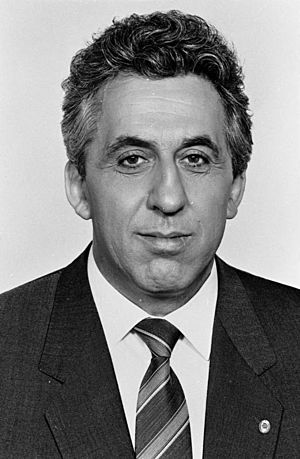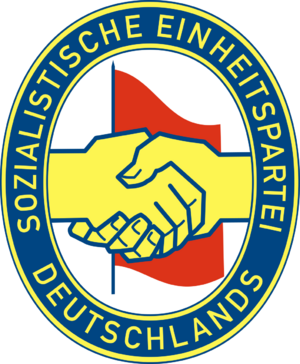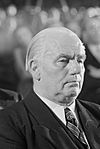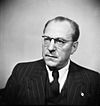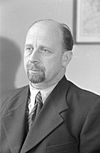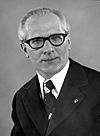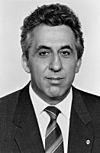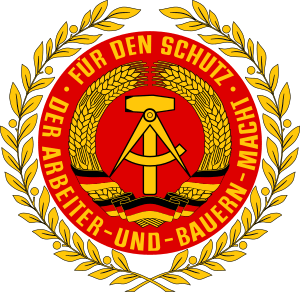Leadership of East Germany facts for kids
Quick facts for kids Leadership of East Germany |
|
|---|---|
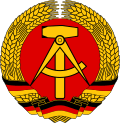
State Coat of arms
|
|
| Residence | Schönhausen Palace Majakowskiring Waldsiedlung |
| Formation | 7 October 1949 |
| First holder |
|
| Final holder |
|
| Abolished |
|
East Germany was a country that existed from 1949 to 1990. During this time, its political leadership was held by different important people and groups. These leaders guided the country and made big decisions.
Contents
Leaders of the Main Political Party
The most powerful group in East Germany was the Socialist Unity Party of Germany (SED). This party held most of the power. Its leaders were very important in running the country.
Joint Chairmen of the Socialist Unity Party
At first, the SED had two leaders who shared power. They were like co-presidents of the party.
| No. | Name | Took office | Left office | Time in office | Party | ||
|---|---|---|---|---|---|---|---|
| . | Wilhelm Pieck (1876–1960) |
22 April 1946 | 25 July 1950 | 4 years, 94 days | SED | ||
| . | Otto Grotewohl (1894–1964) |
22 April 1946 | 25 July 1950 | 4 years, 94 days | SED | ||
General Secretary of the Central Committee
After 1950, the SED had one main leader called the General Secretary. This person was the most powerful leader in East Germany.
| No. | Name | Took office | Left office | Time in office | Party | ||
|---|---|---|---|---|---|---|---|
| 1 | Walter Ulbricht (1893–1973) |
25 July 1950 | 3 May 1971 | 20 years, 282 days | SED | ||
| 2 | Erich Honecker (1912–1994) |
3 May 1971 | 18 October 1989 | 18 years, 168 days | SED | ||
| 3 | Egon Krenz (born 1937) |
18 October 1989 | 6 December 1989 | 49 days | SED | ||
Honorary Chairman of the Central Committee
After his time as General Secretary, Walter Ulbricht held an honorary title.
| No. | Name | Took office | Left office | Time in office | Party | ||
|---|---|---|---|---|---|---|---|
| 1 | Walter Ulbricht (1893–1973) |
3 May 1971 | 1 August 1973 † | 2 years, 90 days | SED | ||
In December 1989, the East German parliament (the People's Chamber) changed the country's rules. This change meant the SED no longer had all the power. This was a big step towards the end of Communist rule in East Germany. The SED then changed its name and became a different kind of political party.
Heads of State
The Head of State is like the main representative of a country. They are often seen as the face of the nation.
| No. | Picture | Name (Birth–Death) |
Took office | Left office | Political Party |
|---|---|---|---|---|---|
| President of the Republic | |||||
 |
Johannes Dieckmann (1893–1969) Acting President |
7 October 1949 | 11 October 1949 | LDPD | |
| 1 |  |
Wilhelm Pieck (1876–1960) |
11 October 1949 | 7 September 1960 | SED |
 |
Johannes Dieckmann (1893–1969) Acting President |
7 September 1960 | 12 September 1960 | LDPD | |
| Chairman of the State Council | |||||
| 1 |  |
Walter Ulbricht (1893–1973) |
12 September 1960 | 1 August 1973 | SED |
 |
Friedrich Ebert Jr. (1894–1979) Acting Chairman |
1 August 1973 | 3 October 1973 | SED | |
| 2 |  |
Willi Stoph (1914–1999) |
3 October 1973 | 29 October 1976 | SED |
| 3 |  |
Erich Honecker (1912–1994) |
29 October 1976 | 18 October 1989 | SED |
| 4 |  |
Egon Krenz (born 1937) |
18 October 1989 | 6 December 1989 | SED |
| 5 |  |
Manfred Gerlach (1928–2011) |
6 December 1989 | 5 April 1990 | LDPD |
| President of the People's Chamber of the GDR | |||||
| 1 |  |
Sabine Bergmann-Pohl (born 1946) |
5 April 1990 | 2 October 1990 | CDU |
Heads of Government
The Head of Government is usually the person in charge of the daily running of the country. They lead the cabinet of ministers.
| No. | Picture | Name (Birth–Death) |
Took office | Left office | Political Party |
|---|---|---|---|---|---|
| Chairman of the Council of Ministers | |||||
| 1 |  |
Otto Grotewohl (1894–1964) |
12 October 1949 | 21 September 1964 | SED |
| 2 |  |
Willi Stoph (1914–1999) |
21 September 1964 | 3 October 1973 | SED |
| 3 |  |
Horst Sindermann (1915–1990) |
3 October 1973 | 29 October 1976 | SED |
| (2) |  |
Willi Stoph (1914–1999) |
29 October 1976 | 13 November 1989 | SED |
| 4 |  |
Hans Modrow (born 1928) |
13 November 1989 | 12 April 1990 | SED / PDS |
| 5 |  |
Lothar de Maizière (born 1940) |
12 April 1990 | 2 October 1990 | CDU |
Heads of Parliament
The parliament (called the People's Chamber in East Germany) is where laws are made. The Head of Parliament leads the meetings and discussions.
| No. | Picture | Name (Birth–Death) |
Took office | Left office | Political Party |
|---|---|---|---|---|---|
| President of the People's Chamber | |||||
| 1 |  |
Johannes Dieckmann (1893–1969) |
7 October 1949 | 22 February 1969 | LDPD |
| 2 |  |
Gerald Götting (1923–2015) |
12 May 1969 | 29 October 1976 | CDU |
| 3 |  |
Horst Sindermann (1915–1990) |
29 October 1976 | 13 November 1989 | SED |
| 4 |  |
Günther Maleuda (1931–2012) |
13 November 1989 | 5 April 1990 | DBD |
| 5 |  |
Sabine Bergmann-Pohl (born 1946) |
5 April 1990 | 2 October 1990 | CDU |
Heads of the Military
The National Defense Council was in charge of East Germany's military and defense. Its chairman was a very important figure in the country's security.
| No. | Chairman of the National Defense Council | Took office | Left office | Time in office | Party | ||
|---|---|---|---|---|---|---|---|
| 1 | Walter Ulbricht (1893–1973) |
10 February 1960 | 3 May 1971 | 11 years, 82 days | SED | ||
| 2 | Erich Honecker (1912–1994) |
3 May 1971 | 18 October 1989 | 18 years, 168 days | SED | ||
| 3 | Egon Krenz (born 1937) |
18 October 1989 | 6 December 1989 | 49 days | SED | ||
 | Bessie Coleman |
 | Spann Watson |
 | Jill E. Brown |
 | Sherman W. White |


